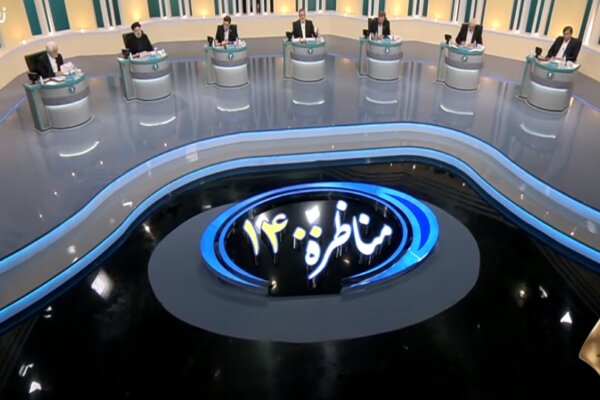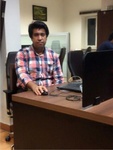The seven hopefuls started their final showdown at 17:00 Tehran local time (1230 GMT) which is under at the headquarters of the Islamic Republic of Iran (IRIB) located in the north of the Iranian capital of Tehran.
Ebrahim Raeisi, Mohsen Rezaei, Mohsen Mehr-Alizadeh, Saeed Jalili, Alireza Zakani, Abdol-Nasser Hemmati, and Amirhossein Ghazizadeh Hashemi are the seven candidates are running in this round of presidential elections in Iran.
The seven contenders discussed “economy” and “politics, culture and society,” as the main themes of the previous two debates.
According to the figures released by election officials, over 59 million Iranians are eligible to vote at 72, 000 polling stations across the country on June 18.
Most of the debate today focused on the people’s livelihood and the solutions to solve the economic problems such as the high inflation rate and foreign economic pressures.
The candidates blamed their rival political camp for being unable to solve the country’s problems.
The Reformist candidate Hemmati blamed the economic sanctions on the country for the economic problems while the Principlist contenders said that mismanagement was to blame.
With regard to the future of the JCPOA, the main candidate in the Principlaist camp Ebrahim Raeisi said that “If the nation’s interests are secured in an agreement, we will support it.”
Raeisi added his future administration will abide by an agreement (JCPOA) that met the Leader’s preconditions.
Meanwhile, he accused the rival camp and the current administration of not being able to implement the deal in the format that was approved by the Leader of the Islamic Revolution Ayatollah Khamenei.
Saeed Jalili, another Principalist contender said that the country needs to focus on the economy in the next four years with reliance on domestic capacities.
Jalili said that there is the possibility of extensive and constructive engagement with the world, especially in the economic field.
Meanwhile, Hemmati said he will support an increased role for women in society, adding that if he elected, he would give small loans to housewives with the aim of increasing their employment rate.
Rezaei, who is considered to be a Principlist candidate, said that if he elected as Iran’s next president, he would take implementing the JCPOA seriously.
“My administration would definitely take the issue of JCPOA seriously. I would compel the United States to implement JCPOA with real diplomacy,” Rezaei said
Ghazizadeh Hashemi, for his part, said that he would support rebuilding the country’s educational system based on new methods.
The Principlist candidate said that he would appoint a foreign minister with a background in international trade.
He also promised to work hard to create jobs for the young generation.
Mehr-Alizadeh, another candidate from the Reformists camp, said that he would support negotiations and engagement with the world, criticizing the delay in approving the FATF-related bills by the Expediency Council.
He leveled accusations against the Principlists and the Judiciary head Raeisi for the riots and violence that erupted in the country after the petrol price hike in 2019.
Rezaei, meanwhile, called for a decentralized economic system and said that he would divide the country into different economic zones in the form of an economy-oriented federal system. He also said that he would increase the subsidies paid to each Iranian per month from the current 450,000 rials ten times to 4,500,000.
Zakani, the other Principlist candidate blamed the mismanagement of the incumbent President Hassan Rouhani for the current economic problems, saying that if he elected, he would seriously fight corruption and nepotism, and would try to eradicate poverty.
Zakani also said he would redistribute wealth to other cities from the capital Tehran.
KI/Live



























Your Comment